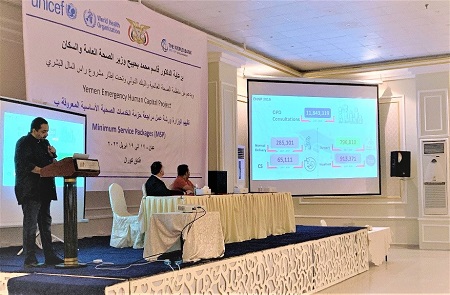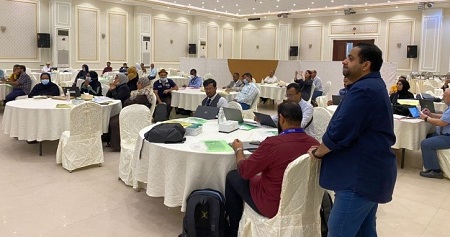 Sana’a and Aden, 29 May 2022 – Every person should have access to the health care they need. That’s why in Yemen, the health authorities, in collaboration with WHO, UNICEF and the World Bank, are reviewing the Minimum Service Package (MSP).
Sana’a and Aden, 29 May 2022 – Every person should have access to the health care they need. That’s why in Yemen, the health authorities, in collaboration with WHO, UNICEF and the World Bank, are reviewing the Minimum Service Package (MSP).
The first MSP was developed in 2017 during a difficult period of intensifying conflict. The package was rapidly developed based on the Disease Control Priorities (DCP3) package and rolled out by the authorities, WHO and UNICEF through the Emergency Health and Nutrition Project with the World Bank’s support, to more than 2000 health facilities in Yemen.
After 5 years of successful implementation, the package is undergoing a rational, needs-based, pragmatic and evidence-based review to determine the essential services required for the health system in Yemen.
The review will update the package of services provided at each level of care (primary, secondary and tertiary) to ensure services are based on the disease burden and relevant to the needs of communities. High-impact interventions will be prioritized, and the package will ensure a continuum of services from prevention through to diagnosis; treatment and rehabilitation is provided at each level of care.
Taking a collaborative, evidence-based approach
The review is currently under way and is expected to be completed by September 2022. Already, the review process has involved intensive consultation, collaboration, engagement and an inclusive approach.
In March and April, workshops with authorities in Sana’a and Aden, brought together more than 100 stakeholders to discuss line-by-line every service offered under the new package. Other stakeholders have also been engaged in thematic discussions on minimum services, complementarity and referrals, which were attended virtually by more than 70 representatives from 30 Health Cluster partners in February. MSP documentation is being made available in Arabic and English to ensure meaningful stakeholder engagement.
In addition, the review is adopting an evidence-based approach, consolidating data from national programmes, the Institute of Health Metrics and Evaluation, and expert experience and validation to better understand the disease burden in Yemen. This analysis has pointed to the importance of continuously strengthening the health information system to ensure reliable data are available to inform policy decisions.
Highlighting the growing burden of noncommunicable diseases in Yemen
For the first time, through the MSP review process, the high burden of noncommunicable diseases (NCDs) in Yemen has been highlighted. This has led to 'quick wins' to tackle the increasing burden of NCDs:
Health authorities have agreed to appoint a full-time NCD focal point to facilitate coordination.
The importance of taking preventive action on NCDs at the primary health care level has been agreed.
The draft MSP 2022 lists human papillomavirus vaccination for girls, hepatitis B birth-dose vaccination, and screening and early detection of common breast and cervical cancers in line with regional and global WHO strategies and goals.
Building a stronger health system
 Going forward, for tangible health system strengthening, implementation of the forthcoming MSP will require clear action plans, a spirit of teamwork, more coordination, and ongoing support. The next steps are to compile the outputs from the recent workshops with the authorities, to determine lists of quality standards, essential laboratory services, equipment and medicines for each level of care, and to proceed with costing of the package.
Going forward, for tangible health system strengthening, implementation of the forthcoming MSP will require clear action plans, a spirit of teamwork, more coordination, and ongoing support. The next steps are to compile the outputs from the recent workshops with the authorities, to determine lists of quality standards, essential laboratory services, equipment and medicines for each level of care, and to proceed with costing of the package.
In rolling out the updated package, continuous action will be taken to engage district and governorate health offices and field authorities to conduct domain-specific workshops e.g. on maternal and neonatal health, child health, NCDs and environmental health, and to invest in strengthening the health information system.








